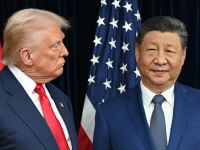Sharp differences on global trade emerged here Saturday at a WTO meeting, but delegates were later in the day expected to find common ground in welcoming China into the World Trade Organization.
The first full day of debate exposed firmly entrenched -- and contradictory -- positions held by key participants to a five-day conference called to forge an agenda for future trade liberalization talks.
Ministers from the 142-member WTO are convening here in the sun-splashed Qatari capital at a luxury hotel -- sealed off to all but authorized participants -- on the shores of the Gulf.
The hardline security measures reflected heightened fears for the safety of delegates in the aftermath of the September 11 suicide attacks in the United States and Washington's subsequent assault on Afghanistan.
Inside the meeting hall, however, minds were concentrated on what should and should not be included in multilateral negotiations to eliminate trade barriers among nations.
WTO Director General Mike Moore, in an inaugural speech Friday, acknowledged that "deep differences remain" despite weeks of pre-conference contacts among WTO members.
His assessment was quickly confirmed Saturday in a harshly worded speech by Indian Minister of Commerce and Industry Murasoli Maran, who accused the WTO of ignoring the needs of poor countries and badgering them to take postions against their will.
In remarks released here, he charged that a draft declaration before WTO ministers was "neither fair nor just to the viewpoints of many developing countries, including my own, on certain key issues."
"It is the negation of all that was said by a significant nunber of developing countries and least developing countries.
"The only conclusion that could be drawn is that the developing countries have little say in the agenda settting of the WTO.
"It appears that the whole process was mere formality and we are being coerced against our will."
Developing countries have made no secret of their dissatisfaction with their treatment by the WTO, insisting that trade-enhancing commitments made by rich nations in a previous -- Uruguay -- round of talks have not been adequately honored.
They have long insisted they cannot be expected to agree to new trade concessions when the provisions of the Uruguay Round have not been fulfilled.
In another demonstration of disunity, the United States refused to lay down its anti-dumping weapon -- hotly disputed by an array of trading partners including Japan -- in order to expand global trade.
Repeated US reprisals against imports it deems to be excessively cheap or harmful to its industries have unleashed a furious reaction overseas, particularly the Japanese steelmakers.
But US Trade Representative Robert Zoellick told the meeting that such measures were critical to maintaining support for free trade at home.
The US public is deeply sceptical about the value of trade liberalization, and Zoellick said he risked losing its backing if the WTO restricted the use of anti-dumping measures against unfairly priced imports and countervailing duties for subsidised imports.
"As you know, we are dissatisifed by the text on WTO rules," Zoellick said.
International trade regulations had been designed to ensure countries could not undermine trade liberalization, he said.
"The rules on anti-dumping and countervailing duties serve that purpose," Zoellick argued.
Japan, still smarting from a US ruling against its steel industry last month reiterated a demand for negotiations to limit the use of anti-dumping measures.
"In order to complement trade liberalization and safeguard the achievements resulting from such liberalization, it is imperative to work for necessary clarification and improvement of the rules on anti-dumping," Japanese Economy, Trade and Industry Minister Takeo Hiranuma told the conference plenary.
"We should bear in mind that a vast majority of members already support this position."
But all such fractiousness should disappear later in the day -- at 6.20 p.m. (1520 GMT) to be exact -- when delegates are expected to approve by consensus the admission of China, the world's most populous nations and one of its most potent economies, to the WTO.
The decision Saturday, capping Beijing's 15-year quest to become a full member of the global trading network, has the potential to give the ailing world economy a shot in the arm while ushering in sweeping changes at home -- DOHA, (AFP)
© 2001 Al Bawaba (www.albawaba.com)







